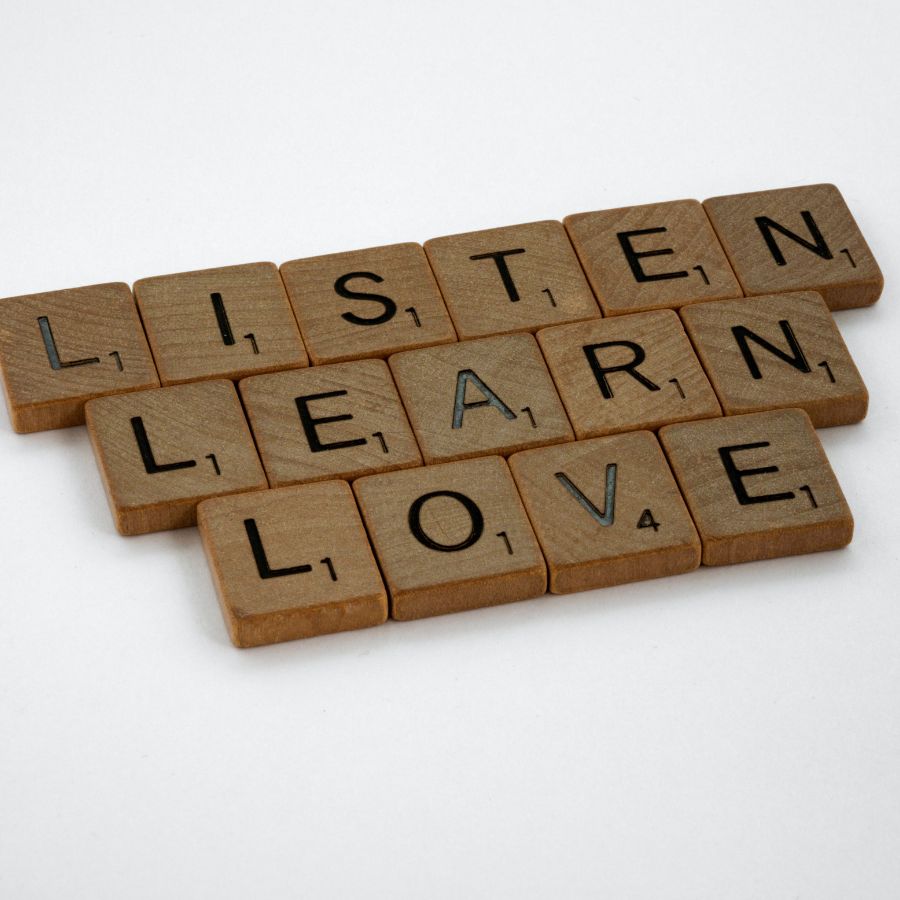Week 9 | Sunday, July 31, 2022
Luke 12:13-21
Week 9 PDF version
1 | begin
Start with a self-compassion prayer or meditation. You can use the Serenity Prayer or a guided meditation on self-compassion (like Kristen Neff’s “Self-Compassion Break” at self-compassion.org) or on lovingkindness (like “Sylvia Boorstein’s Lovingkindness Meditation” at The On Being Project YouTube channel).
2 | explore
Journal on your own about your experiences or share with a group:
If you had to describe who you are to someone you’ve never met, what would you say?
Tell your story about a time when you felt valued. What mattered most to you in that moment?
3 | read
Read Luke 12:13–34. Then read verses 13–21 a second time.
4 | engage
Have you ever faced or dealt with a family member’s belongings after their death? It’s no small or easy experience. Somehow their life can be both present and absent with their stuff, and odd combinations of feelings can surface in this paradoxical reality. A nondescript mug may spark vivid memories of how their hands held it. A furnished room may feel empty without the sound of their laughter. Fine jewelry may have no value to you while a hand-scrawled list seems priceless.
Emotions can become even more complicated when that person’s stuff evokes hurtful memories or unhealed wounds. Figuring out what to do with their belongings after they’re gone can be incredibly hard if figuring out how to navigate your relationship with them was a struggle.
In this week’s gospel reading, when Jesus meets someone apparently feuding with a brother over who gets what of the “family inheritance” (Lk 12:13, NRSVUE), he says, “One’s life does not consist in the abundance of possessions” (12:15). While the surface-level takeaway is a call to resist “greed” (12:15), Jesus’s words go deeper than selfish interior motives or even potentially inequitable distribution of family inheritances. He speaks to some fundamental questions about what we human beings mean to one another.
“Wealth is not life.” “The value of your life is not determined by the value of your stuff.” While many people might affirm these statements, letting them sink in tends to be the hard part. As scholars like Ibram X. Kendi have shown, in a society set up to exploit those it devalues and to devalue those it exploits, everyone is supposed to believe that some people’s lives have less value than others’. Once that belief takes root, not only can the degradation and impoverishment of those people seem somehow justified, [1] but the value of each person’s life can become a question in their own mind rather than a given. Instead of trusting that we are inherently and infinitely valuable human beings, we ask, “Is my life of value?” And when society shouts back day after day, “What you have will tell you what your life is worth,” it can take massive mental energy, guts, or compassion to question that.
When what you have is also tied to what your family has had, the question of the value of your life can morph into a question encompassing the value of your parents’ and grandparents’ lives. The brothers’ argument about their family’s inheritance may have involved deep personal and social as well as economic concerns in their context, a multi-generational family- and community-oriented culture, as scholars like Halvor Moxnes note. [2] The family home or field is not just a thing that can wear a price tag. Whatever possessions—or lack thereof—that each generation passes on can become society’s measure of the value of your own life as well as of the family from which you came. Clothing made by your parent, woven with their presence, can be a powerful touchstone of the life you shared with them, for better or worse, and a social judgment for or against you.
The value of people’s lives comes into sharper focus in Jesus’s parable about a wealthy man who vows to stop after securing just one more bounty of resources. The parable paints a striking contrast between the man’s first thought—how to hold on to the land’s produce—and God’s question to him about who will end up with that produce. Instead of passing the bounty on to others, like people who may have worked his land to produce the crops or to hungry people in his community [3], the man displays concern only for himself. But God’s question directs attention to people like these, people whom the man has neglected and ignored, whose lives deserve to be valued.
When Jesus says that life is not defined by how much you have, he loosens the grip of society’s measure for people’s lives. He reminds us that the value of human lives is a given, not a question, and that fullness of life is found in non-exploitative relationships with one another: family, friend, and neglected stranger in need. For those battling social judgments against or for their own and their family’s worth, this is definitely good news.
5 | respond
Journal on your own or talk with a group about these questions:
1. How does society value and devalue people where you live?
2. When have you had a hard time believing that your life is inherently and infinitely valuable?
3. What stands out to you in Luke 12:13–21? What feelings does the passage evoke for you?
4. What kind of relationship do you want to have with your belongings and with people in light of this passage? What one thing can you do this week to move toward that?
6 | practice
Take a few minutes this week to do one of these activities:

Family Memento
Tell a loved one, write a story, or draw a picture about something that belonged to your family that has or had special significance to you.

Compassion in Action
Show compassion to someone else as well as yourself through a concrete action, like listening, giving, collaborating, or celebrating.
References & Credits
1. Ibram X. Kendi lays out this logic in Stamped from the Beginning: The Definitive History of Racist Ideas in America (New York: Bold Type Books, 2016), 8–11.
2. See Halvor Moxnes, Putting Jesus in His Place: A Radical Vision of Household and Kingdom (Louisville: Westminster John Knox, 2003), 22–45.
3. These dynamics of social and economic disparity are described in Ekkehard W. and Wolfgang Stegemann, The Jesus Movement: A Social History of Its First Century, trans. O. C. Dean, Jr. (Minneapolis: Fortress, 1999), 51–52.
Header image of “Flowers at Sunset” is by Esther Mickan on Unsplash at this link
Image of “Camera and Notebook” is by Glenn Carstens-Peters on Unsplash at this link
Image of “Listen, Learn, Love” is by Brett Jordan on Unsplash at this link
Scripture quotations are from the New Revised Standard Version Updated Edition
The scripture readings come from the Revised Common Lectionary lessons for the Eighth Sunday after Pentecost in Year C, which can be found at the Episcopal Church Lectionary Page here

